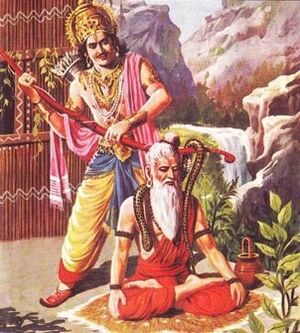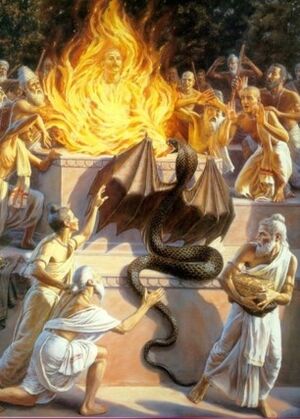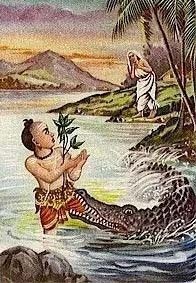Talk:Preparing for Death
By Vishal Agarwal
Towards the end of one’s life, one must gather courage and give up all fear of death. One must give up attachment to one’s body, and everything that relates to it, and forsake all desires that are associated with it as well. Bhāgavata Purāṇa 2.1.15
When death is imminent, we can progressively sever our temporary connections with the world and strengthen our permanent connections with the Supreme Being. This can be done by spending more time in worship and prayer, reading religious books, listening to sermons, and so on. If the dying person is unable to worship himself, his close family members and friends gather around him and sing religious hymns. Śāstras allows a dying person to undergo a custom to become a Sanyasi, as a result of which he formally severs all ties to his family and friends, and retains only his ties with Bhagavān. At the instant of death, the person should try to focus his mind on Bhagavān alone. The various views on why our last thoughts are important are summarized below-
“The last thoughts and the level of consciousness you have at the time of death are extremely important. It should be positive and peaceful. Otherwise, the mind can take the dying person to its next destination, and if the mind is unbalanced, or focused on worldly attachments or affairs, then that is likely to be the nature of the next existence. If the image or thought pattern in the mind of a person who leaves his or her body is strong enough, the mind can get stuck in that pattern for indefinite lengths of time. This is especially the case when a person dies in battle during a war, in something like a car accident, or an unbalanced emotional state. The person may even become a ghost who is continuously reliving a particular incident or state of affairs for years. This also highlights the importance of not committing suicide which is often a result of reaching an intensely low vibration or emotional state of mind. A person may become stuck in that hellish state for many years before realizing the reason for it and how to remedy the situation.[1]”
Sometimes, to feel closer to Bhagavān, aged or dying people may choose to move to a holy city such as Varanasi, which is a center of religious pilgrimage, and stay there till they die. They may want to sip the waters of holy rivers such as the Ganges, on whose banks Swami ji's and Rishi munis' have lived throughout our history, and whose banks are lined with temples. The dying person is also helped by placing sacred icons and divine images in his field of vision.
The dying person also often performs acts of charity, giving alms to the poor and Brahmins, and gifting cherished possessions to one’s relatives and friends, in the hope of earning good karm. They may also confess to their sins and ask for forgiveness from others. He may also decide to devote the remaining days of his life to studying spiritual scriptures or devote himself to acts of worship, chanting holy hymns and mantras. The following celebrated example is from the Bhāgavata Purāṇa-
Story: How King Parīkshit Spent the Last Week of his Life
About 3500 years ago in India, a great war was fought between two groups of cousins – the five Pāṇdava brothers, and 100 Kaurava brothers. The war was fought with 4 million soldiers in a place called Kurukshetra, about 100 miles north of New Delhi, the capital of India. The Pāṇdavas won the war, but all their children were killed. Only their grandson Parīkshit, who was born right after the war, survived. The Pāṇdava brothers took great care that Parīkshit grew up to be a wise, educated, and virtuous Prince.
Yudhishthira, who was the eldest Pāṇdava brother, ruled for more than 30 years. Thereafter, all the five brothers decided to hand over their kingdom to Parīkshit, and they went to heaven.
Parīkshit became the Emperor of India after the Pāṇdava princes retired. He was a very fair and just ruler. He made sure that there were no thieves and murderers in his kingdom. No one in his country went hungry. The rains came on time. He gave lots of donations to learned men and fed the poor. Everyone was happy in his kingdom and they thanked Bhagavān for making Parīkshit their king.
One day, on a hot summer day, Parīkshit went hunting. After pursuing wild deer for several hours, he became very tired and searched for some water. Suddenly, he saw a small hut. He thought that the owner of the hut might have some water. When he entered the hut, he saw Rishi Shamika inside. The Rishi was meditating, with his eyes shut and his mind thinking of Bhagavān. Shamika did not notice the king arrive.
Parīkshit asked Rishi Shamika for some water. But the Rishi was lost deep in meditation and did not hear him. Parīkshit felt insulted and he became very angry. He said, “How dare you ignore your own King? I will teach you a lesson!” Parīkshit looked around and found a dead snake in the grass. He picked the snake with his bow and put it around the neck of Shamika, who was still meditating. Some students of the Rishi who were playing outside the hut saw this. They were shocked. They rushed to Shringi, the son of Shamika, and told him everything. Meanwhile, Parīkshit left for his palace.
When Shringi arrived and saw the dead snake around his father’s neck, he too became very angry. Now, Shringi was also a great Rishi. The words of a Rishi always come true. Therefore, he now cursed Parīkshit, “Seven days from now, a flying snake will bite you to death.” After a few moments, Rishi Shamika came out of his meditation. When he heard what his son had done, he scolded him, “Shringi, what was the need to curse a great king like Parīkshit? He did not do anything that hurt me or harmed me. Rishis should learn to control their anger. What you did was very wrong.” Rishi Shringi now felt very guilty, but he could not take back the curse.
Meanwhile, Parīkshit felt very sorry about what he had done to Rishi Shamika. He thought, “I have always loved everyone. I have always respected Rishis and Pundits. Why did I do such a wicked deed today? Maybe I was irritated because I was thirsty. But even then, I should not have gotten angry at Rishi Shamika. I am sure he did not hear me because he was in deep meditation. Now, what can I do to get punishment for my evil deed, which I did because I did not control my anger?”
Shamika sent a messenger to Parīkshit to inform him that his son had cursed the king to die after seven days of a snake bite. When Parīkshit heard of this, he sent his apologies to Sage Shamika. Then he thought, “I do deserve this punishment. It serves me right. I will now leave my palace and go to the banks of the river Ganga. There, I will spend the remaining seven days of my life worshipping Bhagavān Vishnu and will wait for my death.”
Parīkshit listened to stories of Vishnu for seven days from Rishi Shuka. Then, a snake came and bit him, and he died. But having listened to the inspiring story of Vishnu, he embraced death with a smile. Because he knew that his death would lead him to immortality. The story of Parīkshit shows how even good people can behave very badly when they get angry. Therefore, we should try to control our anger every time.
Śāstras prescribe the ‘ātura sannyāsa’ wherein a person on his deathbed is formally inducted into asceticism and thereby severs all his worldly ties. Transcending all attachments mentally and formally, the individual then focuses completely on the Divine in the hope of transcending the cycle of births and deaths and attaining Moksha. Following is a famous example of a Sant who became an ascetic at his apparent last moments of death-
Story: How Shankaracharya Became an Ascetic
Śaṅkarācārya exhibited exceptional brilliance from an early age; by just eight years old, he had already mastered the Vedas along with many other śāstras. A great dispassion for the mundane world entered his mind, and he wanted to forsake it and become an ascetic. But he was the only child of his widowed mother. Whenever he asked her to permit him to become an ascetic, she refused. One day, as he went to take a bath in a river close to his house, a crocodile grasped his leg. Shankaracharya called out for his mother. As she arrived on the shore, watching the crocodile drag her son into the water, Shankaracharya begged, “Mother, you have never permitted me to become a Sadhu. Now that I am dying, please grant me that permission so that I may die with total detachment from the world and thereby attain Moksha.”
The grieving mother instantly permitted him and broke down in tears. But surprisingly, as soon as she had permitted Shankaracharya to become an ascetic, the crocodile let go of his leg and swam into the depths of the river.
Shankaracharya now declared, “As I have taken Sannyasa, I am now an ascetic with my mother’s blessing.” His mother was happy to see her son alive, but sad to see him go. She said, “When I die, who will light my pyre?” Shankaracharya promised to be at her deathbed and perform her cremation when the moment came – a promise that he fulfilled several years later.
References[edit]
- ↑ Knapp, Stephen. Facing Death, Welcoming the Afterlife. iUniverse Inc., 2008, Bloomington/New York, p. 81.



